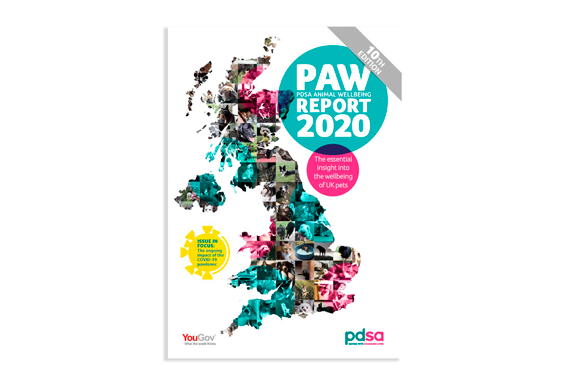
The PDSA Animal Wellbeing (PAW) Report has reached a milestone year, marking a decade of monitoring and analysing pet welfare trends.
Findings from the report, which also offers early indictors into the impact the coronavirus crisis is having on UK pets, suggest that owners are still failing to meet some of their pet’s basic needs, ‘leaving millions of companion animals stressed, overweight and misunderstood’.
In light of PDSA’s warning, the charity is holding a holding a free webinar in partnership with The Webinar Vet on Thursday (December 3) at 12 noon to discuss significant trends and what they mean, featuring leading speakers from across the sector.
WELFARE
. . . . .
The PAW Report – billed as ‘the most comprehensive report into the wellbeing of the UK’s pet dogs, cats and rabbits’ – has monitored pet welfare issues across the UK over the last 10 years, surveying more than 83,000 respondents in that time. Produced in conjunction with YouGov, it provides insight into the lives of pet dogs, cats and rabbits.
“Troublingly, latest findings show a growing concern for the development of behavioural issues in dogs and cats as a direct result of the pandemic restrictions,” PDSA says. One-in-five owners (1.9 million dogs) stated their dog had displayed a new behaviour during lockdown, with 5% saying their dog had started showing signs of distress when left alone, raising concerns over the long-term impact of the crisis on separation-related behaviours.
The report also revealed that nearly a quarter of cat owners (2.3 million cats) noticed new behaviours in their cat since the start of lockdown, with 15% saying their cat was spending more time outdoors and 6% saying their cat was vocalising more (equating to 590,000 cats). PDSA also found that 20% of cats live with another cat they don’t get on with.
OBESITY
Furthermore, the PAW Report shows an association between lockdown and deepening rates of pet obesity, which, when set against a backdrop of an existing pet obesity epidemic, raises long-term concerns and implications for pets and the veterinary professions, warns the charity.
Eight per cent of owners said their dog gained weight during lockdown – potentially affecting 790,000 dogs – while 6% of cat owners said their pet gained weight, with 17% overall admitting to giving their feline friends more treats. This worrying trend can also be seen in rabbit owners, with 14% confessing to feeding more treats in lockdown than before.
PDSA director of veterinary services Richard Hooker said: “The tenth PAW Report is a milestone in PDSA’s ongoing mission to help improve pet wellbeing in the UK. Our continual assessment of the issues highlighted through PAW demonstrates our commitment to providing high quality evidence and insight into how well the UK’s pet dogs, cats and rabbits are having their Five Welfare Needs met…
“The report reflected the enormous positive impact that pets have on people’s lives, something which our vet teams see every day in our Pet Hospitals across the UK – with roughly half of owners surveyed (49%) agreeing that their pet has been ‘a lifeline’ during these challenging times. Our pets play an invaluable role in providing companionship, alleviating stress and loneliness and helping safeguard owners’ health and wellbeing…
LOCKDOWN
“Interestingly, the report has not yet found a significant change in the percentage of UK adults owning a pet dog, cat or rabbit, despite media reports of impulse-buying pets during lockdown. But purchasing pets from inappropriate sources is another major area of concern that the PAW Report has continued to monitor over the past ten years.
“A shocking 91% of veterinary professionals say they’ve seen an increase in imported pets over the last two years. Additionally, findings show that over a four-year period (between 2016 -2020) there has been an eight-percentage point increase in the proportion of owners who would consider getting a pet from outside the UK, rising from 28% up to 36%
“It is vital that we elevate the importance of pre-purchase research in potential owners’ minds and encourage education around safe and responsible ways to take on a new pet.”
Richard concluded: “While we can be encouraged by the areas of pet wellbeing that have improved, there is still much work to be done to ensure our pets receive the care they deserve to live healthy, happy lives.”
Extrapolations to pet population figures are based on the following estimates of pet populations in the UK from the pre-covid survey: 10.9 million cats, 10.1 million dogs and 1 million rabbits. The population estimates from the post-lockdown survey were not statistically significantly different (10.4 million cats, 9.9 million dogs, 800,000 rabbits).


